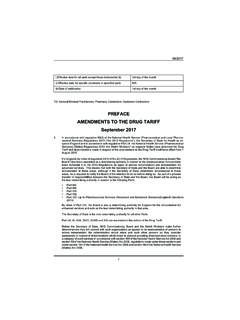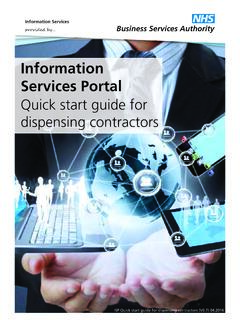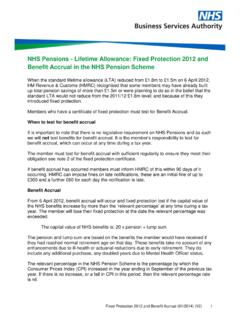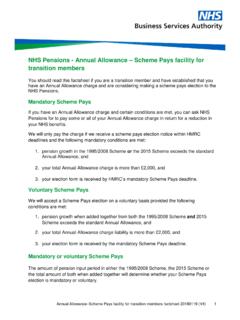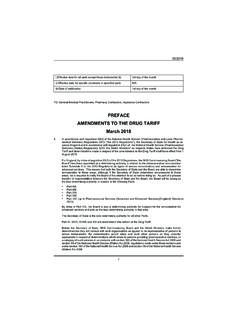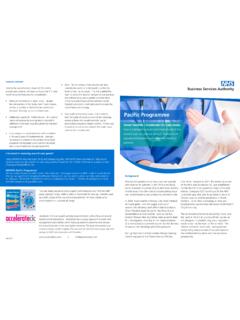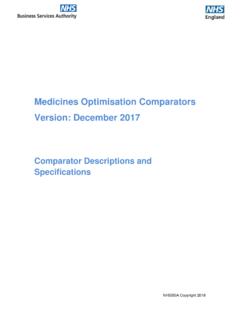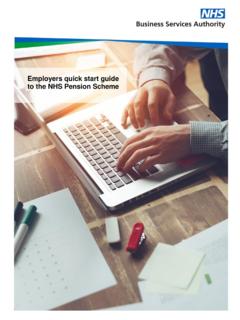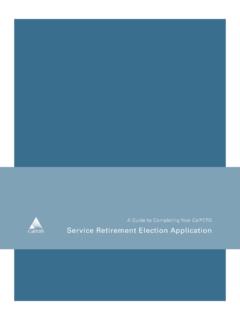Transcription of NHS Pensions - Ill health retirement tiers and FAQs
1 Ill health retirement tiers and FAQs ( ) V8 NHS Pensions - Ill health retirement tiers and FAQs If you think ill health retirement applies to you, please read the ill health retirement assessment factsheet and complete form AW33E available from your employer. You must be leaving work solely because of permanent ill health . If you are dismissed for any other reason you cannot qualify for an ill health pension. There are two tiers of ill health retirement and the benefits you get will depend on whether or not you are capable of undertaking employment elsewhere. The factors that will be taken into account are: whether you have received appropriate medical treatment in respect of the incapacity your mental and physical capacity type and period of rehabilitation which it would be reasonable for you to undergo in respect of your incapacity (irrespective of whether such rehabilitation is undergone) any other matter which the Secretary of State considers to be appropriate.
2 The minimum pension age does not apply in the case of ill health retirement . Ill health Pensions are increased each April in line with increases in the Consumer Price Index (CPI). It may be possible to move between the tiers after retirement where our medical advisers recommend that your condition may be reassessed within three years; certain conditions apply. More information is available in the 'Ill health retirement assessment factsheet'. A reassessment may be recommended if your condition is such that it is not possible to determine at the outset whether your condition will deteriorate to such an extent that you are unable to undertake any regular work or any ongoing treatment will enable you to recover sufficiently to undertake any regular work.
3 If you are terminally ill you may take your benefits immediately as a lump sum. In this case they will be calculated based on Tier 2. Please see the serious ill health (where life expectancy is less than 12 months) factsheet for more information. Your benefits may be reduced if you take up further NHS employment after retiring early due to ill health . You may apply for ill health early retirement by completing a form which you can get from your employer. Ill health retirement tiers and FAQs ( ) V8 If you are a deferred member and you become too ill to undertake regular employment of like duration to your former NHS employment before your Normal Pension Age, you may be able to take your pension early without reduction or any enhancement.
4 If this happens please complete form AW240. Pension Credit members should complete form AW240(PC). Ill health retirement tiers 1995 Section Definition Entitlement Tier 1 Unable to do current NHS job due to permanent ill health Pension will be paid based on Scheme membership built up without reduction. No enhancement to benefits. Tier 2 Unable to carry out regular employment of like duration to NHS employment due to permanent ill health in addition to meeting the Tier 1 condition. Tier 1 benefits, plus an enhancement of two-thirds of your prospective membership to normal pension age.
5 Total membership may not exceed prospective membership at 60. 2008 Section Definition Entitlement Tier 1 Unable to do current NHS job due to permanent ill health . Pension will be paid based on Scheme membership built up without reduction. No enhancement to benefits. Tier 2 Unable to carry out regular employment of like duration to NHS employment due to permanent ill health in addition to meeting the Tier 1 condition. Tier 1 benefits, plus an enhancement of two-thirds of your prospective membership to age 65. Total membership may not exceed prospective membership at 65.
6 2015 Scheme Definition Entitlement Tier 1 Unable to do current NHS job due to permanent ill health . Pension already earned will be paid without Ill health retirement tiers and FAQs ( ) V8 reduction. Tier 2 Unable to carry out regular employment of like duration to NHS employment due to permanent ill health in addition to meeting the Tier 1 condition. Tier 1 plus the Tier 2 addition which is an enhancement based on one-half of prospective membership to normal pension age. Frequently asked questions Q. Is there an age limit for ill health retirement benefits? A. Yes, in order to qualify for ill health retirement benefits your last day of Scheme membership must be before your 60th birthday for members of the 1995 Section, or 65th birthday for members of the 2008 Sections.
7 If you are member of the 2015 Scheme your last day of Scheme membership must be before your State Pension Age (SPA) or age 65 if your SPA is before age 65. This is because ill health retirement benefits provisions are limited to those members who have not reached their normal pension age. Q. How do you decide if I qualify for ill health retirement benefits? A. As decisions depend largely on medical assessments NHS Pensions takes advice from a professional team of medical advisers and doctors qualified in the field of occupational health , our medical services provider. Q.
8 What is the medical advisers role? A. The role of the medical advisers is to carry out an objective and independent professional assessment of all the available medical evidence and offer a recommendation to NHS Pensions based on that assessment. The medical advisers can also commission further medical evidence if they consider it relevant and helpful to their assessment, for example your general practitioner or your specialist. Q. Are there any charges associated with providing medical evidence for my application? A. If you are an active member of the NHS Pension Scheme or in NHS employment you have access to Occupational health Services who will provide the information at no cost.
9 If an alternative source is selected to provide the information then they may charge a fee which you are responsible for. Ill health retirement tiers and FAQs ( ) V8 If you are a deferred member of the NHS Pension Scheme you will not have access to Occupational health Services and you are responsible for any fee incurred in obtaining medical evidence. Q. What are the qualifying conditions for ill health retirement benefits? A. The NHS Pension Scheme provides two levels of ill health retirement benefits, dependent on the severity of your condition and the likelihood of you being able to work again.
10 To qualify for a Tier 1 pension you must be permanently incapable of efficiently carrying out the duties of your NHS employment because of illness or injury. To qualify for a Tier 2 pension you must meet the Tier 1 condition and be permanently incapable of engaging in regular employment of like duration to your NHS job ( either whole time or part time) because of illness or injury. Q. What does permanently incapable mean? A. For the purpose of ill health retirement benefits permanently incapable means until the Scheme s normal pension age. That is age 60 in the 1995 Section, age 65 in the 2008 Section or State Pension Age (SPA) in the 2015 NHS Pension Scheme (or age 65 if this is later).

